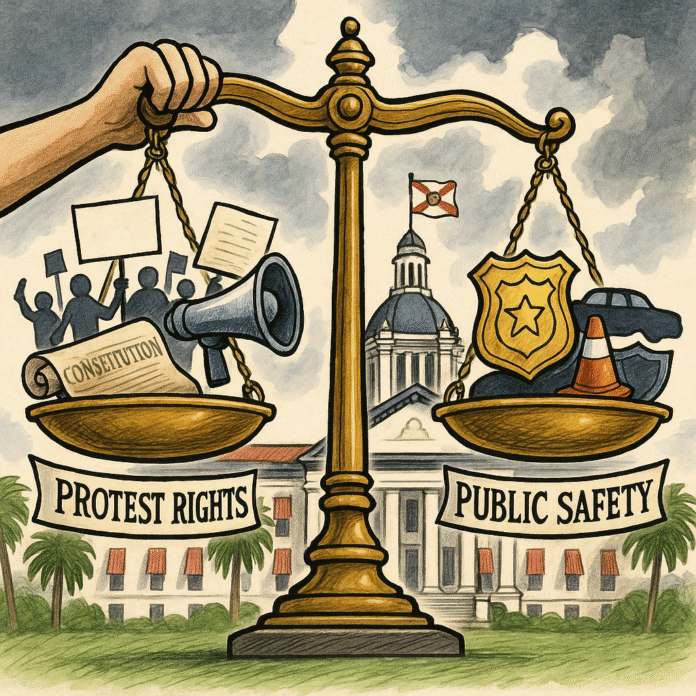DeSantis Doubles Down: Florida’s Controversial Green Light for Drivers
When Protest Meets Pavement: Understanding Florida’s Stand Your Ground on Wheels
Florida Governor Ron DeSantis has reignited national debate by explicitly telling drivers they won’t face liability for hitting protesters who block roadways if they’re “fearful for their lives.” Speaking on The Rubin Report Wednesday night, DeSantis declared that drivers have “a right to flee for your safety” and if protesters get hit, “that’s their fault for impinging on you.” This stark statement comes as nationwide “No Kings” protests are planned for June 14, raising urgent questions about the balance between public safety and constitutional rights.
The Governor’s Controversial Stance
DeSantis made his position crystal clear during his appearance with podcaster Dave Rubin. “If you’re driving on one of those streets and a mob comes and surrounds your vehicle and threatens you, you have a right to flee for your safety,” the Florida Republican stated. “And so if you drive off and you hit one of these people, that’s their fault for impinging on you.”
The governor framed his comments around what he called Florida’s “zero tolerance policy” toward protesters who block traffic without permits. “You don’t have to sit there and just be a sitting duck and let the mob grab you out of your car and drag you through the streets,” DeSantis added, extending what appears to be Florida’s Stand Your Ground law to vehicular situations.
Legal Foundation: The 2021 Anti-Riot Law
DeSantis’ comments aren’t made in a legal vacuum. In April 2021, he signed the controversial House Bill 1, known as the “Combating Public Disorder Act,” which provides civil immunity protections for drivers who strike protesters while “fleeing for safety.” According to Truthout, the law “grants protections to people who use violence against demonstrators engaged in uprisings or protest events.”
The legislation, which took effect immediately upon signing, makes blocking highways a felony punishable by up to 15 years in prison and$10,000 in fines. It also created new crimes including “aggravated rioting” and “mob intimidation,” while preventing local governments from defunding police departments.
Constitutional Concerns and Legal Challenges
Civil rights organizations have consistently challenged the law’s constitutionality. The ACLU of Florida, along with several advocacy groups, filed a federal lawsuit arguing the statute violates First and Fourteenth Amendment protections. In 2021, a federal court issued a preliminary injunction blocking key provisions of the law.
However, the Florida Supreme Court recently clarified that the law’s riot definition “cannot be read to apply to non-violent protestors or bystanders,” providing some protection for peaceful demonstrators.
Kara Gross of the ACLU of Florida told the South Florida Sun-Sentinel that the law “is designed to silence, criminalize and penalize those protesting for racial justice.”
Historical Context and National Implications
The timing of DeSantis’ remarks is particularly significant. They come ahead of planned nationwide protests against the Trump administration’s immigration policies and military deployment in Los Angeles. The governor’s comments also echo similar legislation in other Republican-controlled states, with Oklahoma passing comparable protections for drivers who harm protesters.
The legal landscape around vehicle-protest incidents remains complex. In 2017, James Alex Fields Jr. was convicted of murder for deliberately driving into counter-protesters at the Unite the Right rally in Charlottesville, killing civil rights activist Heather Heyer. Courts determined his actions weren’t self-defense, highlighting the distinction between genuine fear and premeditated violence.
Political Reactions and Public Response
The governor’s statements have drawn sharp criticism from Democratic officials. Florida Agriculture Commissioner Nikki Fried, a potential DeSantis challenger, called the law “a flagrant assault on freedom that criminalizes peaceful protests.” She argued it “will move Florida backwards on social justice, silencing voices only asking that their lives be valued the same as other Americans.”
Adora Obi Nweze, president of the NAACP Florida State Conference, described the legislation as “racist, discriminatory, unwise, unlawful, and unjust,” specifically targeting “Black and Brown Floridians.”
Social media reactions have been polarized, with some praising DeSantis for protecting drivers while others condemn what they see as state-sanctioned violence against protesters.
The Broader Implications for Democracy
DeSantis’ explicit endorsement of vehicular force against protesters represents a significant escalation in the ongoing tension between public order and constitutional rights. Legal experts worry about the precedent this sets, particularly given the subjective nature of determining when someone feels “threatened” enough to justify potentially deadly force.
The governor’s comments also come as the Trump administration has deployed military forces against protesters in Los Angeles, suggesting a broader pattern of using force to suppress dissent. As Newsweek reported, this represents an expansion of self-defense concepts to situations involving political expression.
Looking Ahead: June 14 Protests
With “No Kings” protests planned for this weekend, DeSantis’ statements take on immediate relevance. Protest organizers have emphasized their demonstrations will be peaceful and are providing de-escalation training to participants. However, the governor’s explicit permission for drivers to use vehicles as weapons creates a dangerous dynamic.
The intersection of protest rights and public safety will likely face its next major test as demonstrators take to Florida’s streets. Whether DeSantis’ words embolden vigilante actions or serve merely as political posturing remains to be seen.
The Path Forward
Florida’s approach to protest policing reflects broader national divisions about the role of civil disobedience in democracy. While public safety concerns are legitimate, critics argue that laws like HB1 tip the scales too far toward suppressing dissent rather than protecting genuine self-defense rights.
As America grapples with questions of democratic participation and civil rights, Florida’s experiment with vehicular immunity may serve as either a cautionary tale or a model for other states. The ultimate test will be whether these policies enhance public safety or simply provide legal cover for violence against those exercising their constitutional rights.
The stakes couldn’t be higher. In a democracy, the right to peaceful protest stands as a cornerstone of civic engagement. When that right collides with vehicles on public streets, the consequences extend far beyond individual incidents to the very foundation of American democratic expression.



